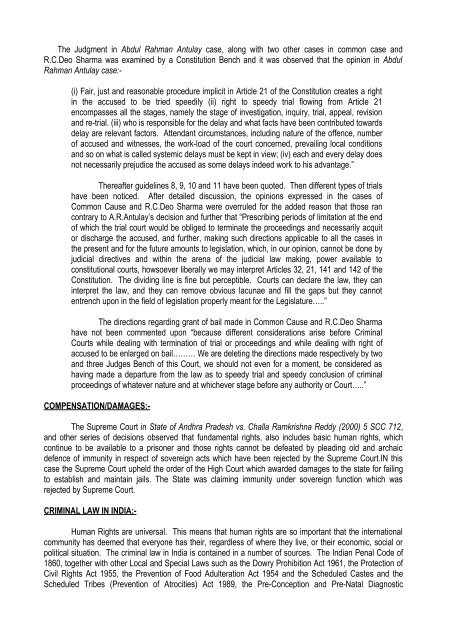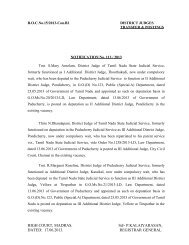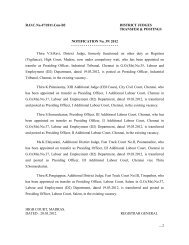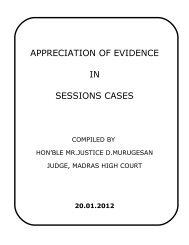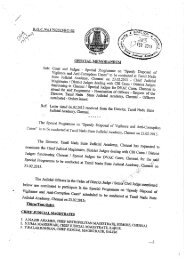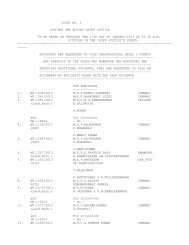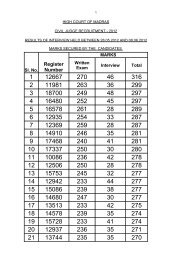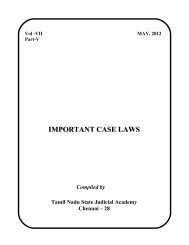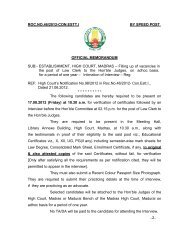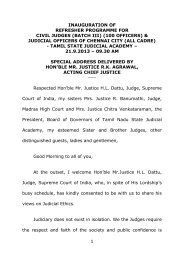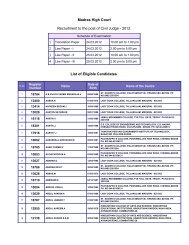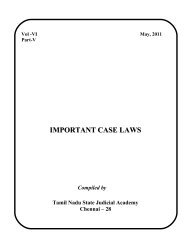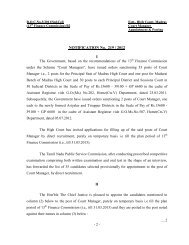Role of Prisoners and Convicts under the Criminal Justice ...
Role of Prisoners and Convicts under the Criminal Justice ...
Role of Prisoners and Convicts under the Criminal Justice ...
You also want an ePaper? Increase the reach of your titles
YUMPU automatically turns print PDFs into web optimized ePapers that Google loves.
(i) Fair, just <strong>and</strong> reasonable procedure implicit in Article 21 <strong>of</strong> <strong>the</strong> Constitution creates a right<br />
in <strong>the</strong> accused to be tried speedily (ii) right to speedy trial flowing from Article 21<br />
encompasses all <strong>the</strong> stages, namely <strong>the</strong> stage <strong>of</strong> investigation, inquiry, trial, appeal, revision<br />
<strong>and</strong> re-trial. (iii) who is responsible for <strong>the</strong> delay <strong>and</strong> what facts have been contributed towards<br />
delay are relevant factors. Attendant circumstances, including nature <strong>of</strong> <strong>the</strong> <strong>of</strong>fence, number<br />
<strong>of</strong> accused <strong>and</strong> witnesses, <strong>the</strong> work-load <strong>of</strong> <strong>the</strong> court concerned, prevailing local conditions<br />
<strong>and</strong> so on what is called systemic delays must be kept in view; (iv) each <strong>and</strong> every delay does<br />
not necessarily prejudice <strong>the</strong> accused as some delays indeed work to his advantage.”<br />
Thereafter guidelines 8, 9, 10 <strong>and</strong> 11 have been quoted. Then different types <strong>of</strong> trials<br />
have been noticed. After detailed discussion, <strong>the</strong> opinions expressed in <strong>the</strong> cases <strong>of</strong><br />
Common Cause <strong>and</strong> R.C.Deo Sharma were overruled for <strong>the</strong> added reason that those ran<br />
contrary to A.R.Antulay’s decision <strong>and</strong> fur<strong>the</strong>r that “Prescribing periods <strong>of</strong> limitation at <strong>the</strong> end<br />
<strong>of</strong> which <strong>the</strong> trial court would be obliged to terminate <strong>the</strong> proceedings <strong>and</strong> necessarily acquit<br />
or discharge <strong>the</strong> accused, <strong>and</strong> fur<strong>the</strong>r, making such directions applicable to all <strong>the</strong> cases in<br />
<strong>the</strong> present <strong>and</strong> for <strong>the</strong> future amounts to legislation, which, in our opinion, cannot be done by<br />
judicial directives <strong>and</strong> within <strong>the</strong> arena <strong>of</strong> <strong>the</strong> judicial law making, power available to<br />
constitutional courts, howsoever liberally we may interpret Articles 32, 21, 141 <strong>and</strong> 142 <strong>of</strong> <strong>the</strong><br />
Constitution. The dividing line is fine but perceptible. Courts can declare <strong>the</strong> law, <strong>the</strong>y can<br />
interpret <strong>the</strong> law, <strong>and</strong> <strong>the</strong>y can remove obvious lacunae <strong>and</strong> fill <strong>the</strong> gaps but <strong>the</strong>y cannot<br />
entrench upon in <strong>the</strong> field <strong>of</strong> legislation properly meant for <strong>the</strong> Legislature…..”<br />
The directions regarding grant <strong>of</strong> bail made in Common Cause <strong>and</strong> R.C.Deo Sharma<br />
have not been commented upon “because different considerations arise before <strong>Criminal</strong><br />
Courts while dealing with termination <strong>of</strong> trial or proceedings <strong>and</strong> while dealing with right <strong>of</strong><br />
accused to be enlarged on bail……… We are deleting <strong>the</strong> directions made respectively by two<br />
<strong>and</strong> three Judges Bench <strong>of</strong> this Court, we should not even for a moment, be considered as<br />
having made a departure from <strong>the</strong> law as to speedy trial <strong>and</strong> speedy conclusion <strong>of</strong> criminal<br />
proceedings <strong>of</strong> whatever nature <strong>and</strong> at whichever stage before any authority or Court…..”<br />
The Judgment in Abdul Rahman Antulay case, along with two o<strong>the</strong>r cases in common case <strong>and</strong><br />
R.C.Deo Sharma was examined by a Constitution Bench <strong>and</strong> it was observed that <strong>the</strong> opinion in Abdul<br />
Rahman Antulay case:-<br />
COMPENSATION/DAMAGES:-<br />
The Supreme Court in State <strong>of</strong> Andhra Pradesh vs. Challa Ramkrishna Reddy (2000) 5 SCC 712,<br />
<strong>and</strong> o<strong>the</strong>r series <strong>of</strong> decisions observed that fundamental rights, also includes basic human rights, which<br />
continue to be available to a prisoner <strong>and</strong> those rights cannot be defeated by pleading old <strong>and</strong> archaic<br />
defence <strong>of</strong> immunity in respect <strong>of</strong> sovereign acts which have been rejected by <strong>the</strong> Supreme Court.IN this<br />
case <strong>the</strong> Supreme Court upheld <strong>the</strong> order <strong>of</strong> <strong>the</strong> High Court which awarded damages to <strong>the</strong> state for failing<br />
to establish <strong>and</strong> maintain jails. The State was claiming immunity <strong>under</strong> sovereign function which was<br />
rejected by Supreme Court.<br />
CRIMINAL LAW IN INDIA:-<br />
Human Rights are universal. This means that human rights are so important that <strong>the</strong> international<br />
community has deemed that everyone has <strong>the</strong>ir, regardless <strong>of</strong> where <strong>the</strong>y live, or <strong>the</strong>ir economic, social or<br />
political situation. The criminal law in India is contained in a number <strong>of</strong> sources. The Indian Penal Code <strong>of</strong><br />
1860, toge<strong>the</strong>r with o<strong>the</strong>r Local <strong>and</strong> Special Laws such as <strong>the</strong> Dowry Prohibition Act 1961, <strong>the</strong> Protection <strong>of</strong><br />
Civil Rights Act 1955, <strong>the</strong> Prevention <strong>of</strong> Food Adulteration Act 1954 <strong>and</strong> <strong>the</strong> Scheduled Castes <strong>and</strong> <strong>the</strong><br />
Scheduled Tribes (Prevention <strong>of</strong> Atrocities) Act 1989, <strong>the</strong> Pre-Conception <strong>and</strong> Pre-Natal Diagnostic


